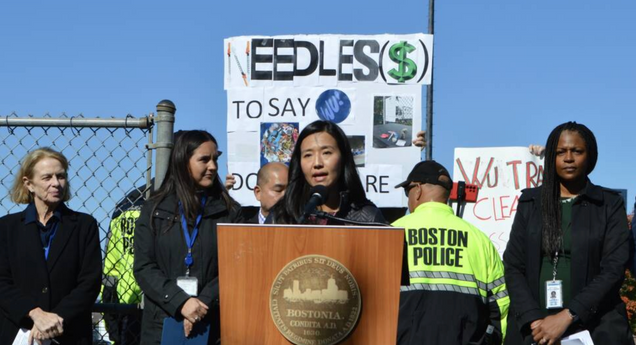GHB News: Amid calls to increase policing at Mass. and Cass, overtime spending surges under Mayor Wu

By Tori Bedford, Photo: Tori Bedford / GBH News
Contributing students were Walker Armstrong, Eunyeong Park, Lily Kepner and Matthew Batacan, with assistance from faculty members Brooke Williams and Langdon White.
Last year, hundreds of people living in tents along the intersection of Melnea Cass Boulevard and Massachusetts Avenue faced a traumatizing nightly choice: to freeze outside or risk theft, COVID-19 exposure or abuse at a nearby shelter.
At the same time, residents in the area felt unsafe in their homes and neglected by city officials, as crime rates increased and previous efforts to solve the crisis offered only hopelessness.
Mayor Michelle Wu — from her very first day in office — promised to transform the troubled stretch known as Mass. and Cass, a crossroads in the heart of Boston marked by a concentration of homelessness, substance use disorder, mental health issues, poverty and crime.
One year into her tenure, Wu faces criticism from all sides: state officials, residents and business owners are calling for a tougher crackdown on crime, while public health experts say more resources are needed for treatment and housing.
Some of Wu’s critics argue that her stated mission to “lead with public health, not criminalization” went too far — with too much money spent on the unhoused and not enough on policing.
But data obtained by GBH News shows the Wu administration is continuing to pump more resources into an already years-long surge of police overtime at Mass. and Cass.
In the first 10 months of Wu’s tenure, up through August 2022, Boston police logged more than $4 million in overtime payments in the area, according to police payroll records.
Between 2021 and August 2022, the city spent around $8 million on police overtime, payroll data show — nearly double the $4.3 million spent in the previous two years combined.